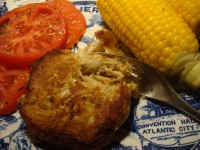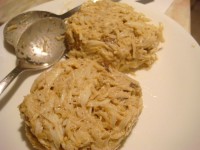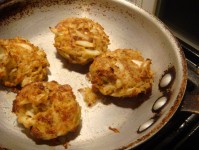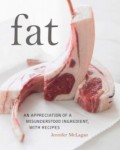Podcast: Play in new window | Download
This week, I put together a very quick late-summer meal: Maryland-style crab cakes, sliced tomatoes and corn on the cob with butter. (For more on how I got this crab-cake recipe, visit my food blog.)
Shopping list
-
- Lump crab meat, 1 cup or so (about 1/3 or 1/2 pound)
-
- Egg
-
- Mayonnaise
-
- Dijon mustard
-
- Bread crumbs or saltine crackers
-
- Baking powder
-
- Ripest, juiciest tomato you can find
-
- Corn on the cob
- Butter
Baltimore-style Crab Cakes
 First, a disclaimer: the ingredients here are all Maryland, but the actual shape of the crab cake is not. (I guess I instinctively replicate the salmon cakes my mom used to make for dinner.) For a more authentically Baltimorean look, see the note and the photo at the end of the recipe, provided by Peter.
First, a disclaimer: the ingredients here are all Maryland, but the actual shape of the crab cake is not. (I guess I instinctively replicate the salmon cakes my mom used to make for dinner.) For a more authentically Baltimorean look, see the note and the photo at the end of the recipe, provided by Peter.
Now let me just say: there is nothing better than a really simple crab cake with very good crab. So, while there are some varieties of canned crab that are passable, most of them are awful, and you should make an effort to get fresh (or at least pasteurized) crab meat–see the note at the end of the recipe for more details.
Serve with sliced ripe tomatoes, generously salted, and corn on the cob, boiled in salty water for just a couple of minutes. In the podcast, I drain the water off the corn, then toss a bit of butter into the pot with the hot corn and shake it around to coat everything–much easier than trying to smear butter on at the table. Be sure to drizzle any remaining butter-and-corn-water over the corn and tomatoes when you put it on your plates.
Serves 2 with summer (ie, somewhat light) appetites
1 egg
1 cup lump crab meat (about 1/3 pound; see note)
Large dollop mayonnaise (about 1 tbsp)
Small dollop Dijon mustard (about 1 tsp)
Old Bay, to taste
1/4 tsp baking powder
1-2 tbsp bread crumbs or crushed saltine crackers (see note)
1 tbsp butter
Whisk the egg up in a small bowl until the white and yolk are well blended. Place the crab meat in a larger bowl, then drizzle in about half of the whisked egg. Add the mayonnaise, mustard, Old Bay (start with about 1/2 teaspoon; add more if you like spicy, or if your Old Bay is showing its age) and baking powder and mix well. The mix will likely be beige-orange from the Old Bay, and fairly wet. Add the bread crumbs, starting with 1 tablespoon, and adding a bit more if the mix still looks like it won’t hold its shape when scooped with a spoon. (If you’re making the mix in advance, don’t add any extra crumbs–as the mix sits, the crumbs will absorb more of the moisture.)
 Shape the mix into two crab cakes, as in the photo (or see the more traditional method in the notes below). Melt the butter in a heavy skillet over medium heat. When the butter is bubbling, slide the crab cakes into the skillet and turn the heat to medium-low. Place a lid over the skillet for about 2 minutes to cook through to the center of crab cake. When the bottom is nicely browned, after about 4 minutes, flip it and brown the other side. The crab cakes are done when they’re nicely browned and moist but not oozing liquid inside.
Shape the mix into two crab cakes, as in the photo (or see the more traditional method in the notes below). Melt the butter in a heavy skillet over medium heat. When the butter is bubbling, slide the crab cakes into the skillet and turn the heat to medium-low. Place a lid over the skillet for about 2 minutes to cook through to the center of crab cake. When the bottom is nicely browned, after about 4 minutes, flip it and brown the other side. The crab cakes are done when they’re nicely browned and moist but not oozing liquid inside.
Notes:
Crab: If you live on the East Coast, you can probably get fresh, cooked lump crab meat from a good fish store. Backfin crab meat is good too–a little more shredded, and so a little cheaper, but also often tastier, and a fine texture for the crab cakes. Elsewhere in the country, whatever crab meat you get will be pasteurized, and not quite as tasty, but not bad. Marylanders of course use blue crab only, but king crab meat (from Alaska) is also delicious, though Dungeness crab doesn’t (in my mind) have quite the same sweetness. I did once use a passable brand of canned crab, but I have not been able to find it again–if I do, I’ll post the details here.
Bread crumbs: In the podcast, I use panko, or super-crispy Japanese-style bread crumbs. This is very handy to have around the house, and it lasts forever. Look for it at Asian stores. You can of course make your own bread crumbs, but avoid the supermarket-standard bread crumbs, especially any with any kind of seasoning, as they tend to glom together too much. It’s traditional in Maryland to use crushed-up saltine crackers, though I can’t say for certain whether they’re better or worse than the other options.
 Shaping your crab cakes: Peter bit into these crab cakes and said, “I’m torn between saying how delicious they are and criticizing them.” He objects to the shape. It’s true, they ought to be more rounded, as in the photo–and it is quite nice to have some little shaggy bits of crab sticking out to get more browned than the rest. And Peter also prefers to broil his crab cakes, for about 4 minutes on a side directly under the broiler (use a heavy skillet, so they’re easy to rotate around under the heat if necessary). If you take the broiler approach, cut the butter into four pieces, then put a dab on top of each crab cake when you slide it under the broiler; then, when you flip them, add another dab. Really, a little butter makes all the difference.
Shaping your crab cakes: Peter bit into these crab cakes and said, “I’m torn between saying how delicious they are and criticizing them.” He objects to the shape. It’s true, they ought to be more rounded, as in the photo–and it is quite nice to have some little shaggy bits of crab sticking out to get more browned than the rest. And Peter also prefers to broil his crab cakes, for about 4 minutes on a side directly under the broiler (use a heavy skillet, so they’re easy to rotate around under the heat if necessary). If you take the broiler approach, cut the butter into four pieces, then put a dab on top of each crab cake when you slide it under the broiler; then, when you flip them, add another dab. Really, a little butter makes all the difference.

 Crab Cake
Crab Cake
